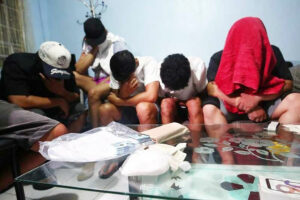By Chloe Mari A. Hufana
LAW and diplomacy experts said on Wednesday that former senator Antonio F. Trillanes IV’s assumption that the International Criminal Court (ICC) can have former president Rodrigo R. Duterte arrested by the International Police (INTERPOL) based on an arrest warrant is very unlikely.
“The INTERPOL argument may work, similar to what Trillanes has mentioned. However, he needs to bear in mind that at the end of the day, it (the arrest) will not transpire if (Philippine) state authorities perceive the Red Notice differently,” Josue Raphael J. Cortez, diplomacy and international affairs lecturer at De La Salle-College of St. Benilde, told BusinessWorld in a Facebook Messenger chat.
He said that even if the ICC issues an arrest warrant for Mr. Duterte, enforcing it in the Philippines boils down to political will of the country’s leadership in applying its own laws.
“The law of the land still reigns supreme over the powers both of the INTERPOL and the ICC,” said Mr. Cortez.
In a media briefing on Tuesday, Mr. Trillanes claimed that the ICC is expected to issue an arrest warrant against Mr. Duterte and his cohorts by June or July, this year. He added that the arrest warrant may be implemented through INTERPOL’s issuance of a Red Notice.
“[INTERPOL] has no agents with power to arrest. It serves as a coordinating agency and provides assistance on matters of information, communication, and databases,” National Union of Peoples’ Lawyers (NUPL) president Ephraim B. Cortez told BusinessWorld in a Viber message.
He added that INTERPOL can only facilitate the implementation of arrest warrants issued by one jurisdiction to be implemented in another. Only local law enforcement agencies can implement the arrest.
Mr. Cortez also stressed that political will on the part of the government’s leadership plays a vital role in implementing such warrants as “it would still depend on Filipino state authorities whether they will — or will not — undertake the arrest of Duterte.”
“If the policy of the (Philippine) Government is not to cooperate, the local law enforcement agencies will definitely follow their government’s directive, and will not implement the warrant,” he said.
Earlier pronouncements by President Ferdinand R. Marcos, Jr. flatly stated that his administration will not lift a finger to assist the ICC in its investigations into Mr. Duterte and his administration’s bloody war on drugs.
Meanwhile, Department of Justice (DoJ) Spokesman Jose Dominic F. Clavano IV in a Viber message to reporters said the department is working on possible options for any ICC warrants.
“We are preparing a brief on the legal options available to the President in relation to any ICC arrest warrants, with an awareness that policy frameworks may evolve. The brief will be an objective analysis of the pros and cons of each option,” said Mr. Clavano.
He confirmed that among these options is the Philippines’ rejoining the ICC, which would in effect compel the country to enforce any warrant issued by the ICC.
“We would just like to emphasize that the stance has not changed but we want the President to know all his options and all the implications,” he said.
Previously, Mr. Trillanes posted in his X account that there are 50 active and retired Philippine National Police (PNP) officials interviewed by the ICC on their “crimes against humanity” investigation under Mr. Duterte’s administration.
Mr. Clavano stressed that the Philippines has a working justice system and does not require external interference to prosecute such cases.
“The government’s stance has been consistent. The President has been very firm by saying we do not recognize the jurisdiction of the ICC because we have a well and robust justice system,” he said in a Malacañang briefing last April 25.
